In 2009, Ashleigh Parsons had an ah-ha moment: she was working at an after-school program in San Francisco’s Tenderloin neighborhood—at the time, an area known more for its access to drugs and prostitutes, than for organic produce—when she took notice of her students’ diets. “I was upset with what we allow our kids to eat,” she says looking back. And on her way into work or at lunch, she faced the same limited options for herself. “There was only a liquor store around us, and I’d get maybe a Clif Bar to eat.”
Parsons then decided to mix up her students’ usual Saturday field trip and take them to a farmers market at the Ferry Building. “I felt it was very important to go and share this place that I found inspiring,” Parsons recalls. “I also had this feeling that they would just love it.”
The students picked seasonal fruits from the stalls to make a fruit salad together. When they gathered to eat, “Their faces lit up,” Parsons says. “They went back for seconds and thirds. Some of them had never tasted such fresh fruits before.” It changed her views on what the program could be and how she could affect change in the students’ lives.
But putting it into action would have to wait. Parsons left the program soon after, and her life changed course (spending time in France, then earning a master’s degree at Harvard). Then, in 2012, she got a call from Ari Taymor, a friend she had met in San Francisco. Taymor wanted her to come to Los Angeles and be his partner in opening a restaurant called Alma. Parsons agreed, but under one condition: she insisted the restaurant be involved in the community. “I felt this urgency. When we’re creating something that is for profit, and we’re creating something that is trendy, and relevant, and newsworthy—how can we not then attach it to education?” Taymor agreed, and Alma Community Outreach (ACO) was born.
After Alma received multiple accolades (the restaurant was named Bon Appetit’s best new restaurant in America in 2013), Parsons began to wonder how they could bring their approach and extend their success to the classroom. ACO wanted to encourage an interest in education. “People say they care—and they definitely care about their own children and their own communities—but education itself is not trendy, it’s not sexy, and it’s not newsworthy. And I’ve tried to think about what model will allow us to bring education into the conversation, because it’s the backbone of our society.” Parsons studied after-school programs at Harvard, and while there were many wellness-focused curriculums around the country, “there wasn’t a program that was blending all of these sensory aspects of learning together: cooking, gardening, movement, conversation—all these human soft skills.”
She knew ACO was a valuable program with the potential to affect students’ lives, but the few schools she approached turned her down. Her new challenge was laid before her.
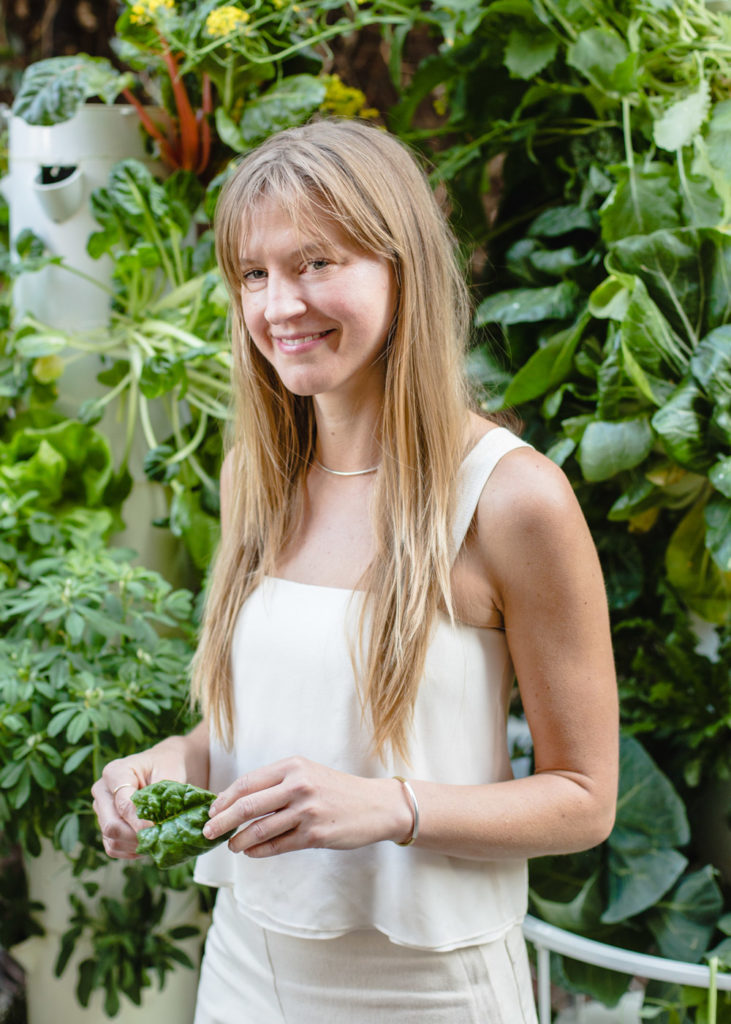
——
On an early spring day in March, I visit the Camino Nuevo Charter Academy along the border between Los Angeles’ Silver Lake and Rampart neighborhoods. The high school is a windowless wall from the street, but reveals a courtyard buzzing with life inside. As rain clouds loom above, twenty-eight students gather in a classroom for their environmental justice elective.
“Tuesdays are for their cooking class,” teacher Roberto Auchterlonie says, meaning it’s the day Akasa [ACO changed its name to Akasa after the shuttering of Alma] works with the students. Veda Romero, Akasa’s director, and Araz Martin, a former cook at Alma and now the program’s lead chef, are addressing the class, explaining the day’s plan.
“We’re going to have mango ceviche today, and we’ll make our own Tajin,” Martin says, and the students respond with an excited rumble.
“All the students live within a few-mile radius,” Auchterlonie explains. “They don’t have the healthiest food at home, and they have no idea of where the food comes from.”
For today’s ceviche, the students harvest radishes, lettuce, baby carrots, and cabbage leaves from gardening beds Akasa maintains in the school’s central courtyard. Meanwhile, up on the second-floor terrace, five students harvest cilantro from three hydroponic towers purchased from Lettuce Grow—a company under the umbrella of Zooey Deschanel and husband Jacob Pechenik’s The Farm Project.
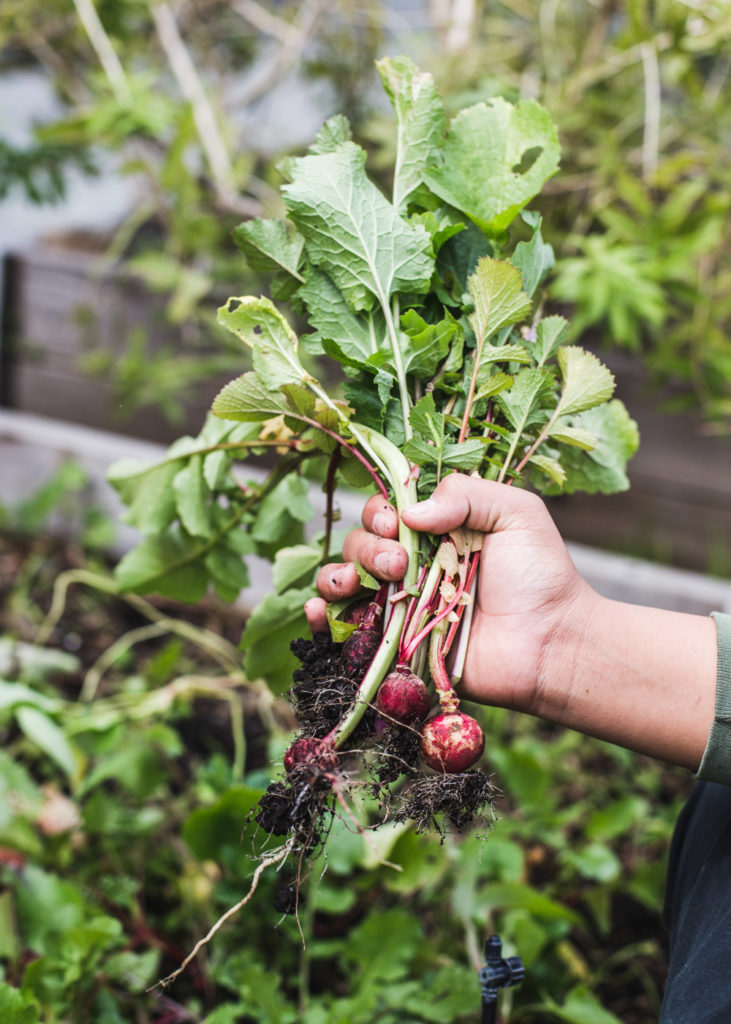
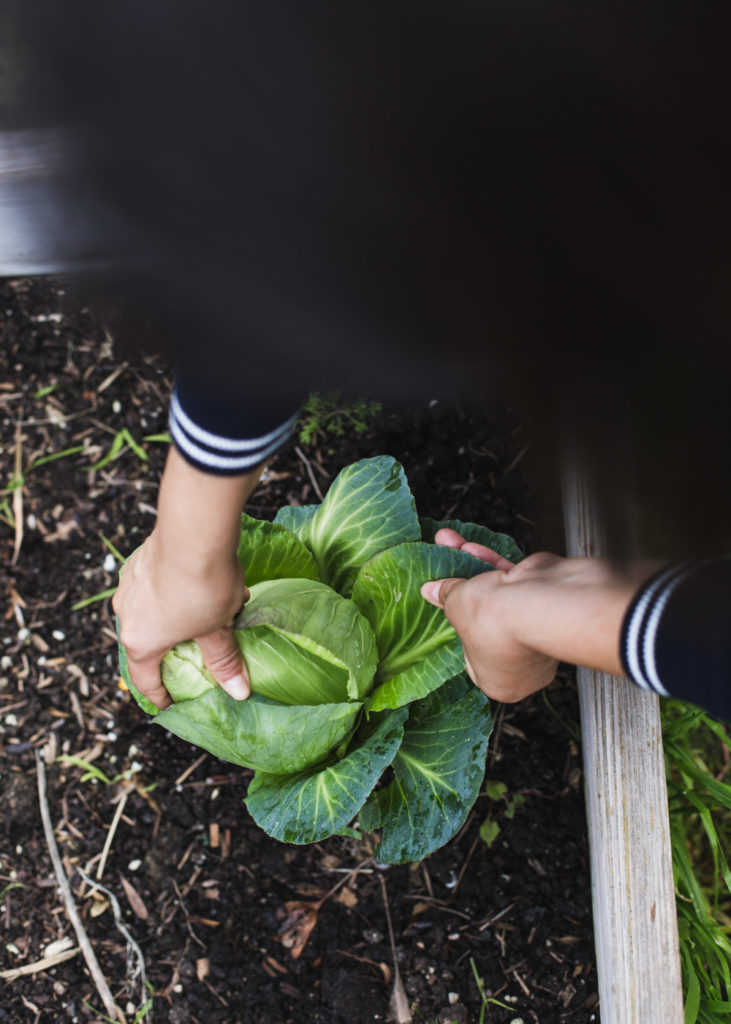
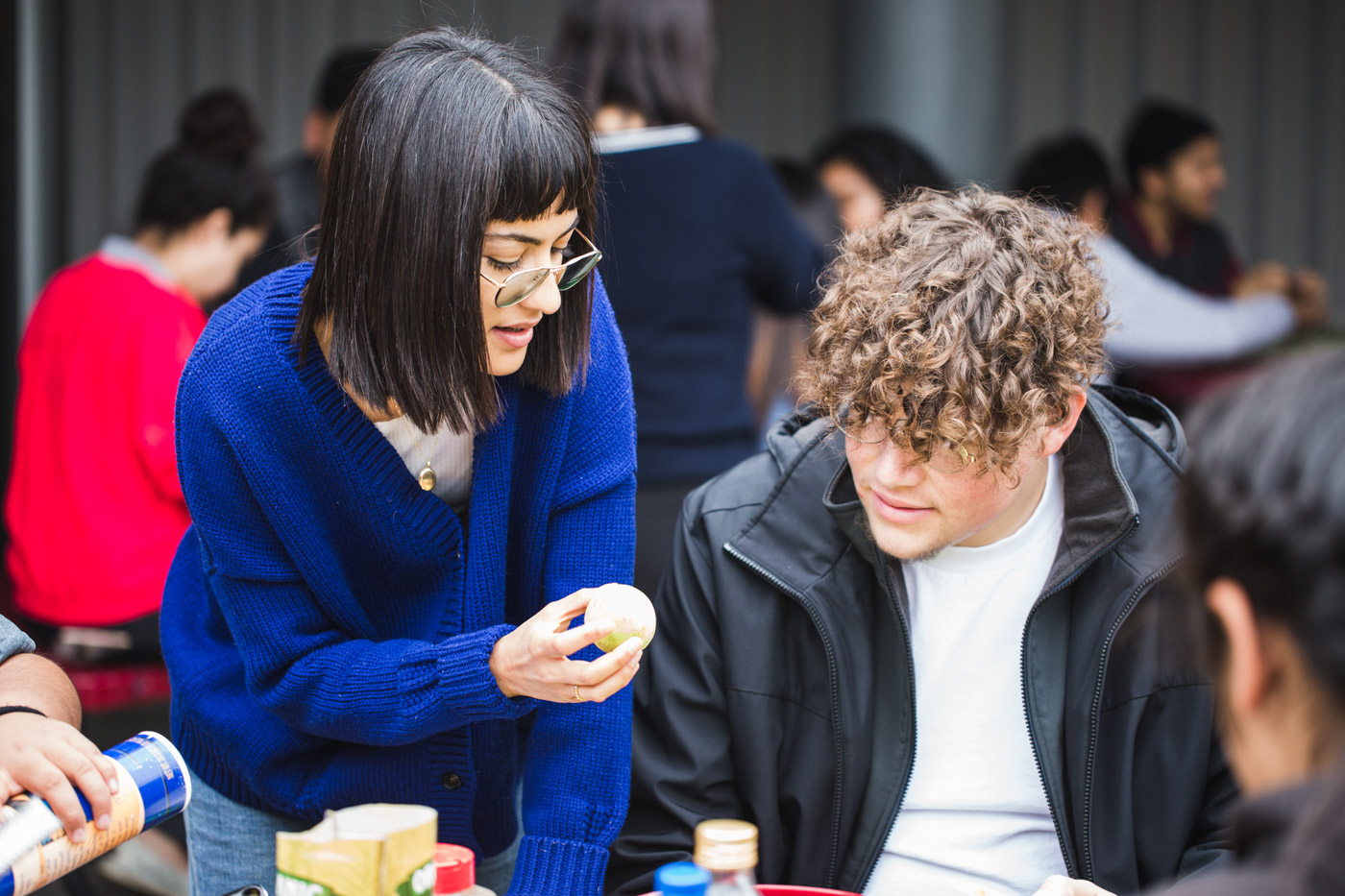
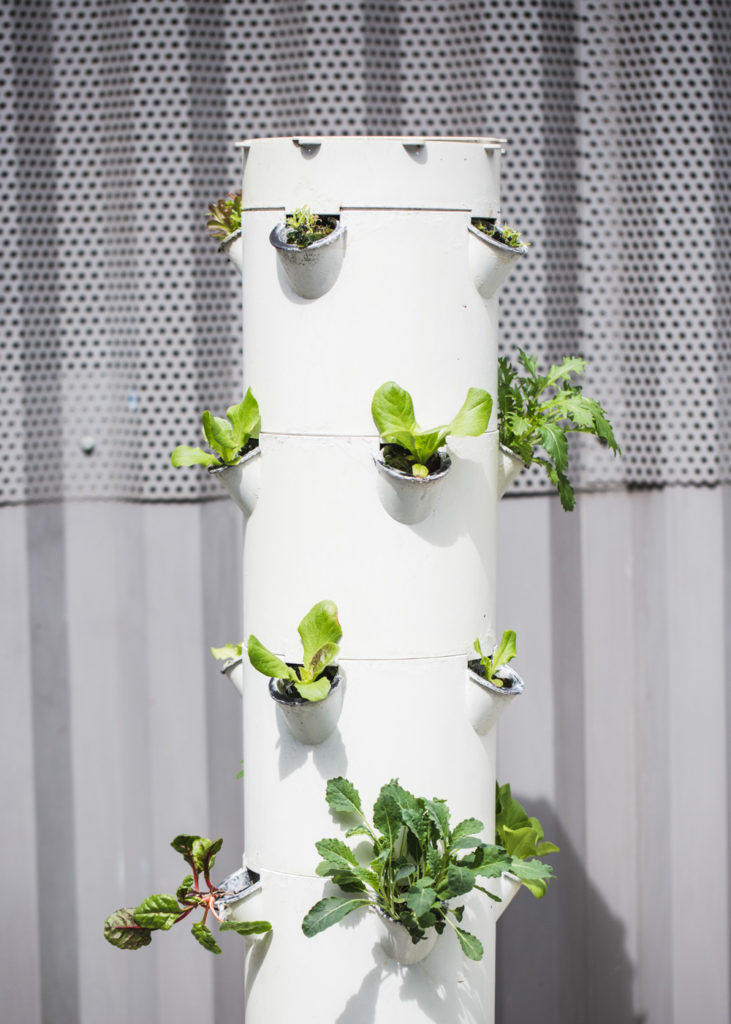
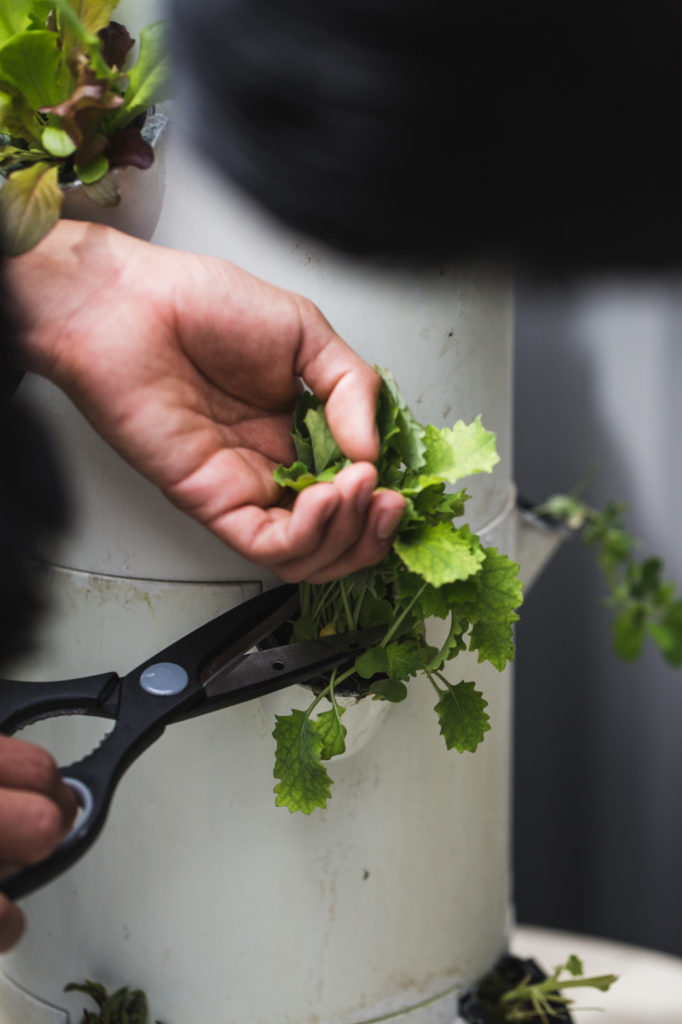
After harvesting, Martin assigns students various tasks: four on mango duty, two to cut up avocados, three to chop onions, and another student to wash cabbage leaves at a nearby drinking fountain. The students sit in groups working with their hands, talking, sneaking slices of food as they prep the ingredients. It feels natural, ancestral, communal.
“It took about four years to figure out what the program is,” Parsons explains. “There was a lot of experimentation. Only in the last year or two have we really got it down.” Today, the program works with three charter schools and a youth center, and estimates that it reaches over two hundred students, ages six to eighteen, on a weekly basis.
“Veda has fully realized Akasa,” Parsons continues. Romero, who is a native of the Rampart neighborhood and fluent in Spanish, has prioritized the parent workshop aspect of Akasa’s community integration. “We now have monthly PWs with twenty-five to thirty-five parents” at each school, Parsons adds, emphasizing the importance of this component. “A program is nullified without weaving in parents and the community.”
The workshops are a mirror of the class, and are open to all parents of a school, even those without children in the program, Romero tells me. “They happen once a month in the mornings. We have them do everything the students do—harvest, cook,” she continues. “Parents will respond to what their children make in school and ask us about it: ‘My daughter really liked that lentil salad. How did you make it?’ We teach them, and give them the shopping list.”
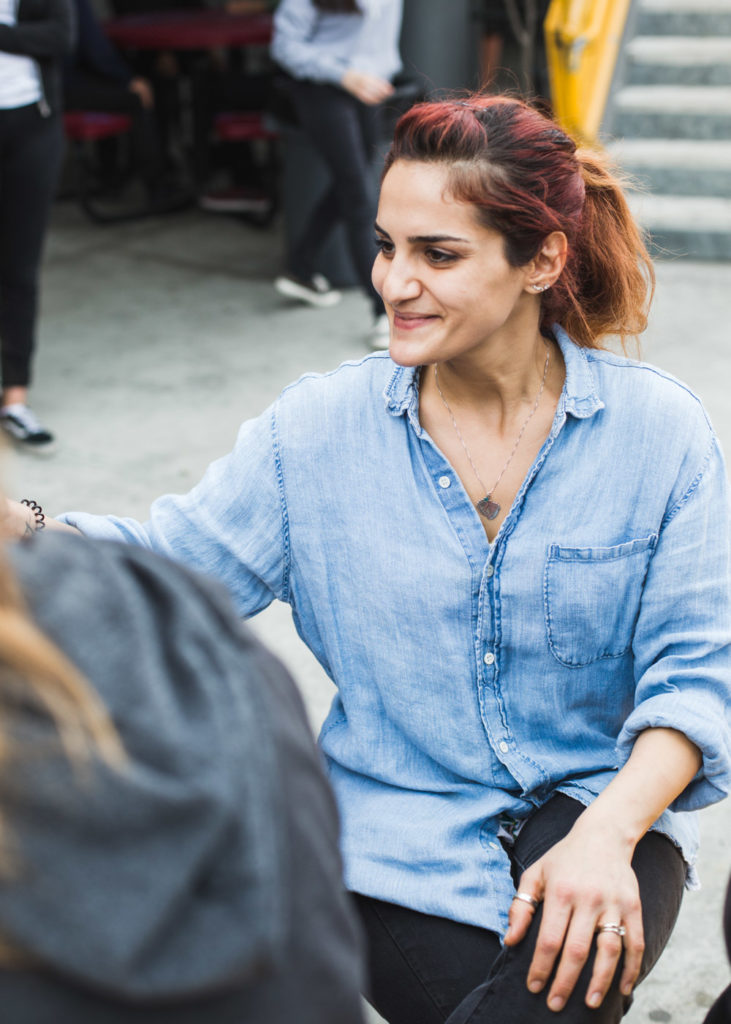
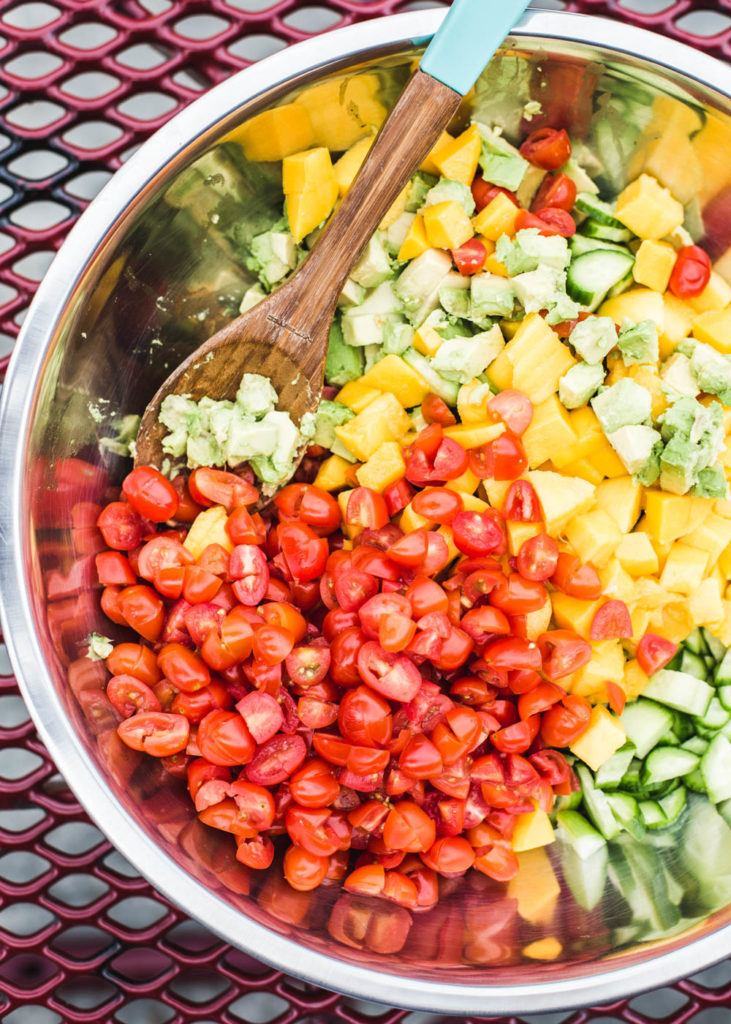
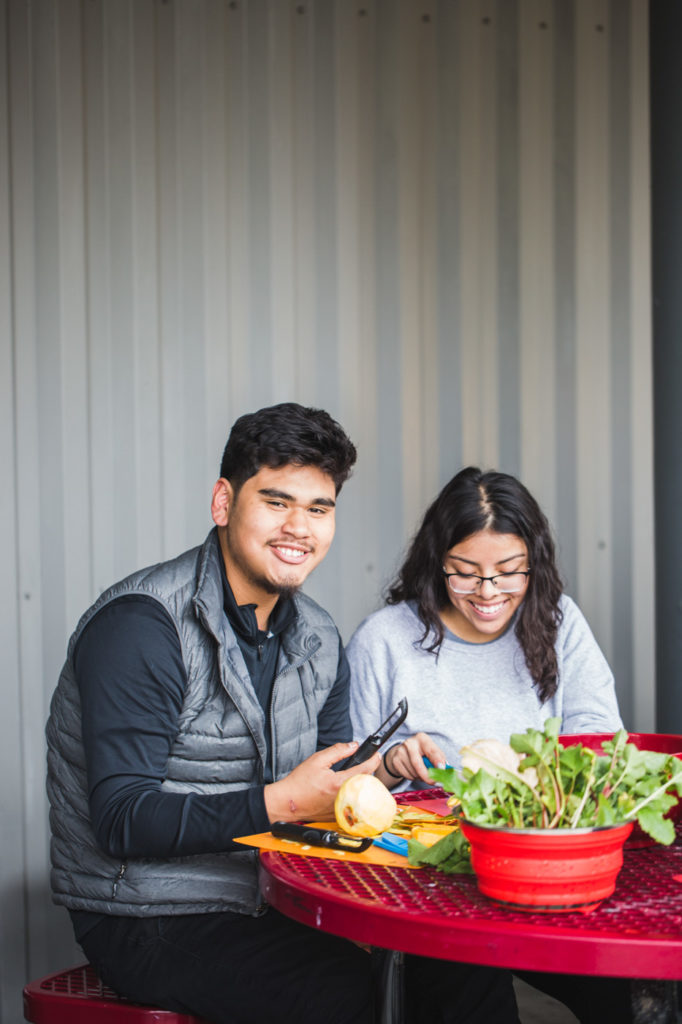
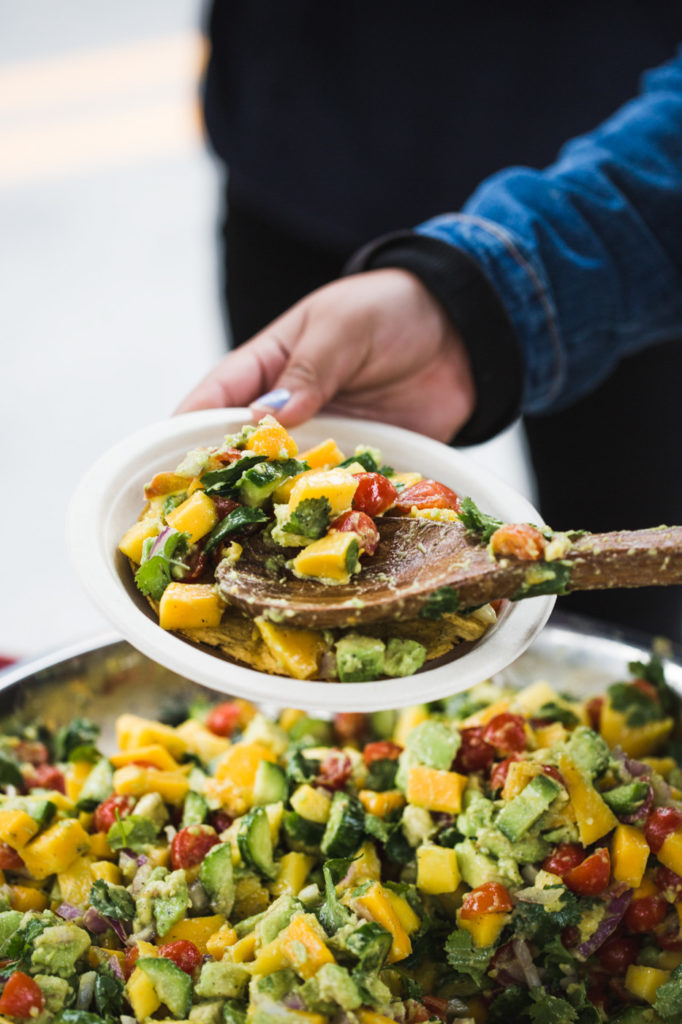
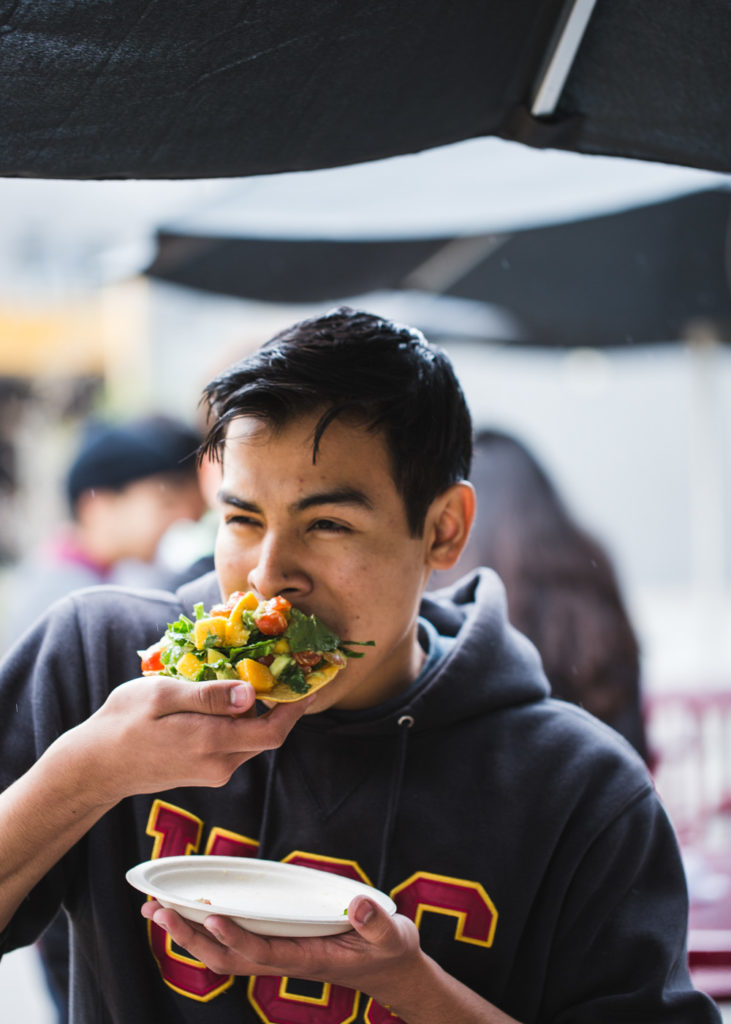
“The program is very easy to scale and grow,” Parsons notes. “Meals are sometimes less than one dollar per student.”
With the ceviche ready, Martin calls everyone to gather around a lunch table. One student is plating tostadas while another is topping them with the ceviche and serving her classmates. Martin notices some students already eating. “We all worked on this recipe together, so we should all sit down and enjoy it together,” she tells the group.
Two Akasa volunteers stand to address the class. “What was the main ingredient today?” one asks. “Mango!” a student responds. They then begin a discussion of the nutritional value of mango, cabbage, and some other of the day’s ingredients before shifting to the importance of fiber in a diet.
——
David Wynn is sitting around a small table at Triniti, the Echo Park café he and chef/partner Joe Geiskopf opened in late 2017. Beyond its coffee and pastry options, Triniti serves Michelin-level food that would have been unimaginable in the Echo Park of five years ago. But as popular as Triniti may be, Wynn hasn’t lost sight of his and Geiskopf’s bigger goals.
“We’re not just trying to do cool food—but we’re trying to put L.A. on a different platform,” he begins. “Everyone thinks L.A. is the next food scene, which is true, and it is, and it will be. But can we also ride this wave and add something to it that will change the environment, change how people think about food, how people treat plastic, how people treat farming, how people treat public schools and education?”
The answer (or part of it) didn’t take long to walk in the door. “Ashleigh came in the first week we were open,” Wynn says. “She came in with a handful of lemon verbena from the student garden. It was her way of welcoming us to the community.” One of Akasa’s schools is down the street from Triniti in Echo Park. “I gave her my contact, and told her to reach out if she needed anything for her non-profit.”
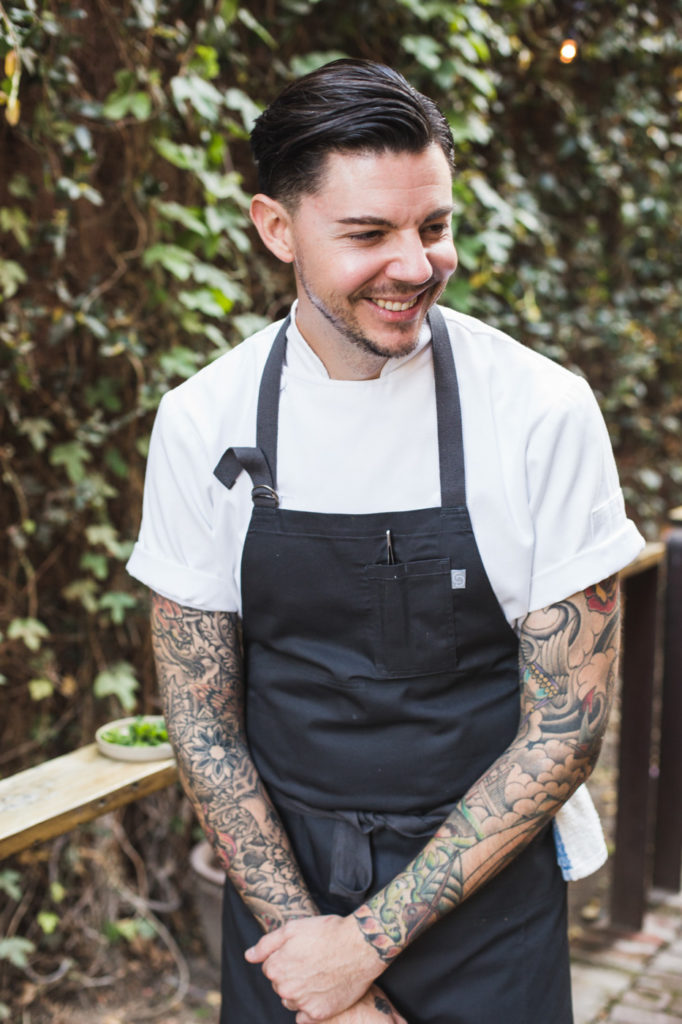
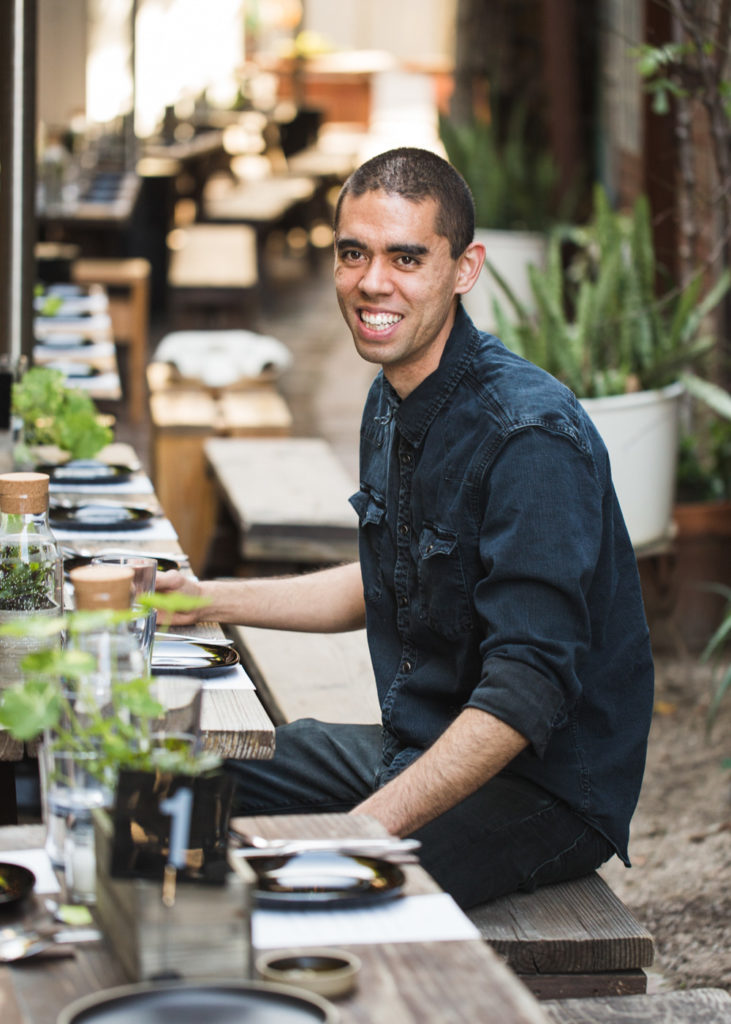
Not a month later, Parsons followed up. “We sat down for a meeting, and I had a chance to learn where the [lemon verbena] came from,” Wynn continues. “Me and Joe always talked about wanting to be part of community-driven events once we get settled in, and it happened that she came in. [Hers] was exactly the kind of organization we wanted to support.”
The answer to how best offer Akasa support quickly centered around a series of dinners. The first dinner of the series took place in late March. Some fifty guests—chefs, media, investors, friends and family—assembled in the verdant alleyway of the Daily Dose Café in L.A.’s Arts District.
Guests were greeted with flutes of champagne and hors d’oeuvres. Two hydroponic towers bursting with plants took the place of a step-and-repeat. Britt Browne of Finca Tierra Negra arranged a display of her soil composted from Triniti’s used espresso grounds and food waste, and Girl & Dug Farms displayed small containers of their microgreens to be used in that night’s dinner.
As the sun set and the string lights hanging over the alley flickered into a warm glow, guests transitioned from mingling to the dinner tables. Geiskopf was busy in the kitchen producing a five-course tasting menu that included a “wild things” salad using Girl & Dug’s herbs with a sharply acidic lemon vinaigrette, a course of potatoes and mochi dressed with sake lees-infused butter (lees is a byproduct of the sake-making process), cod prepared in two ways (one a crudo of the belly on a bed of herbs and buttermilk, a second with a blackened butter sauce made from the bones of the fish), with a dessert course of toasted banana and almond milk ice cream.
By the end of the meal, Parsons, Wynn, Geiskopf and Sarkis Vartanian (owner of Daily Dose) stood to thank the guests for their involvement and support. If the night was a statement of purpose for Triniti, Akasa, and the web of players coalescing around their common goals, it was a moment that promises exciting things to come.
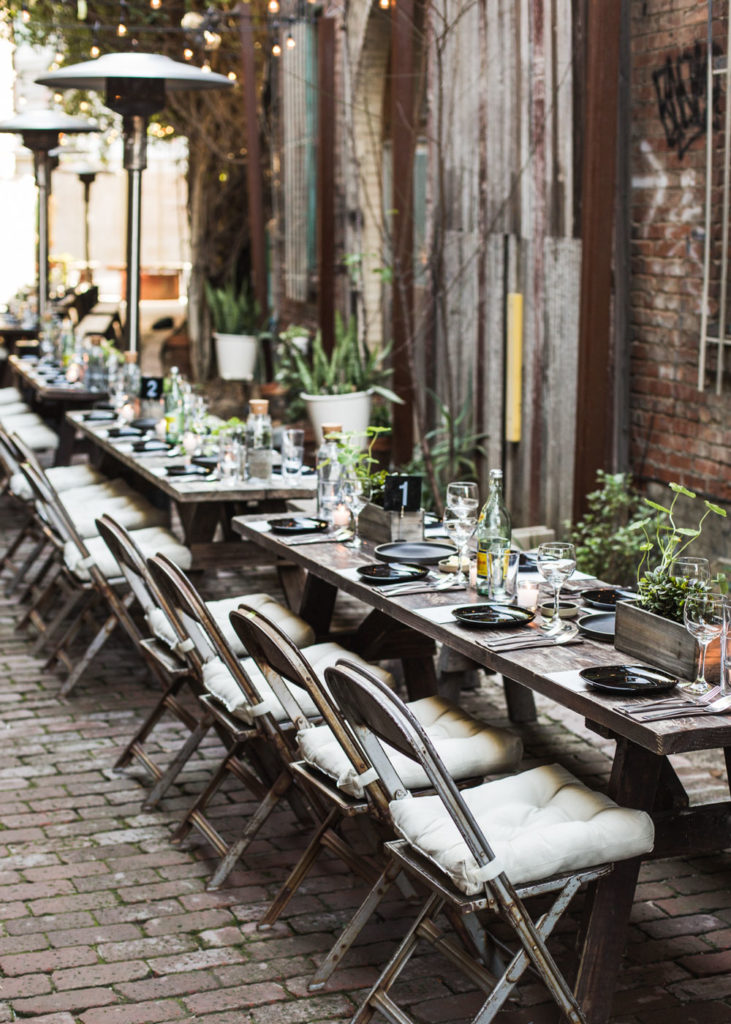

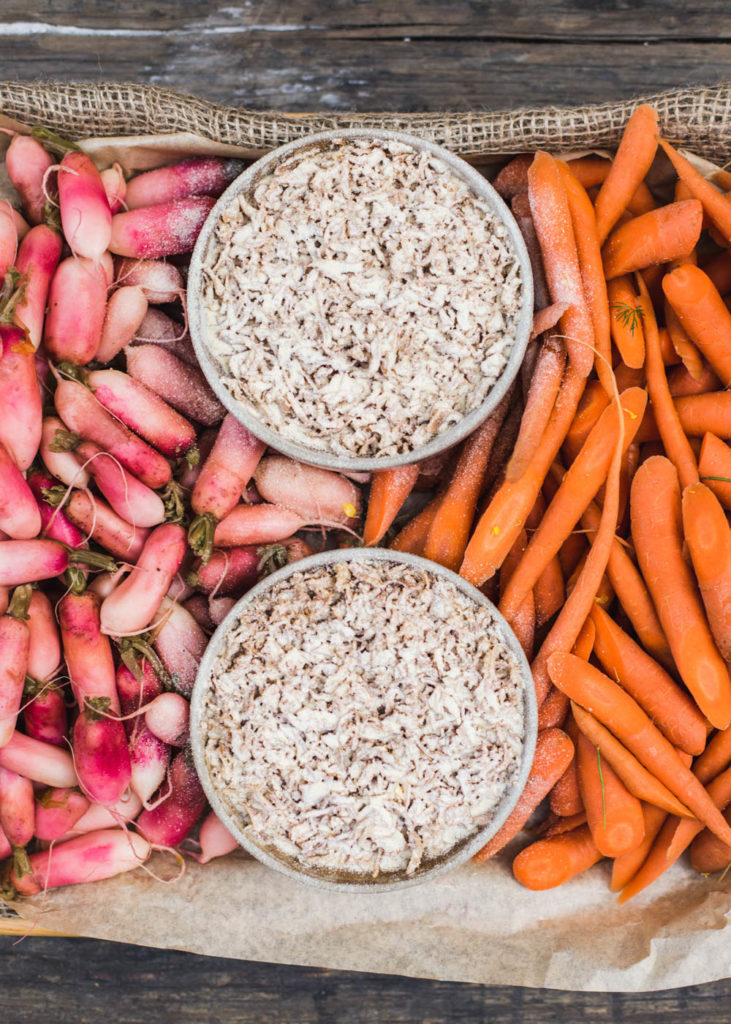
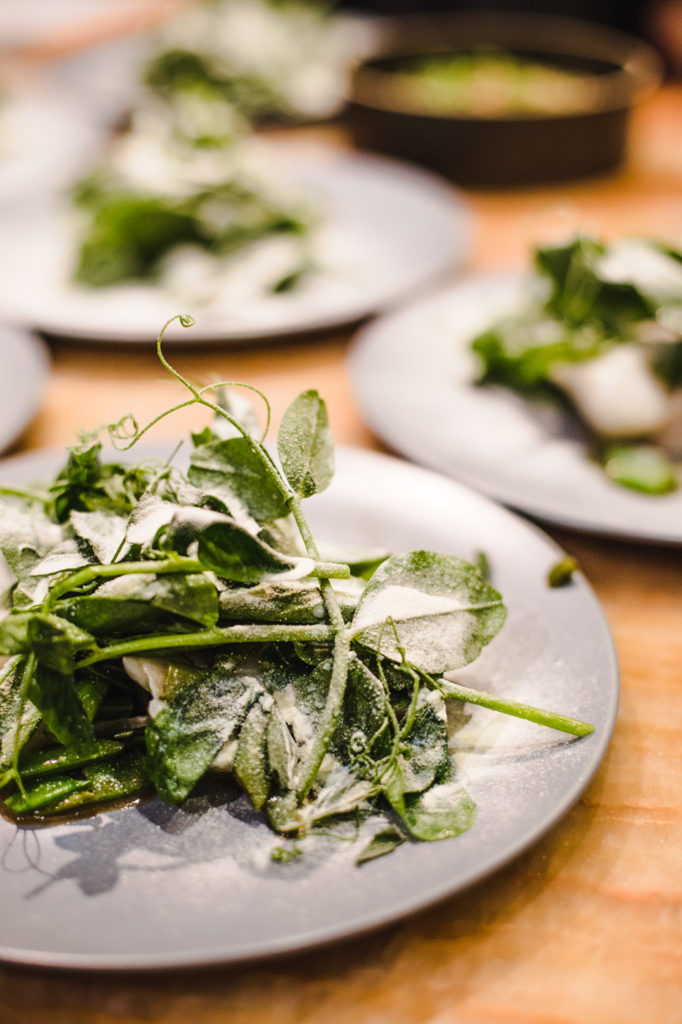
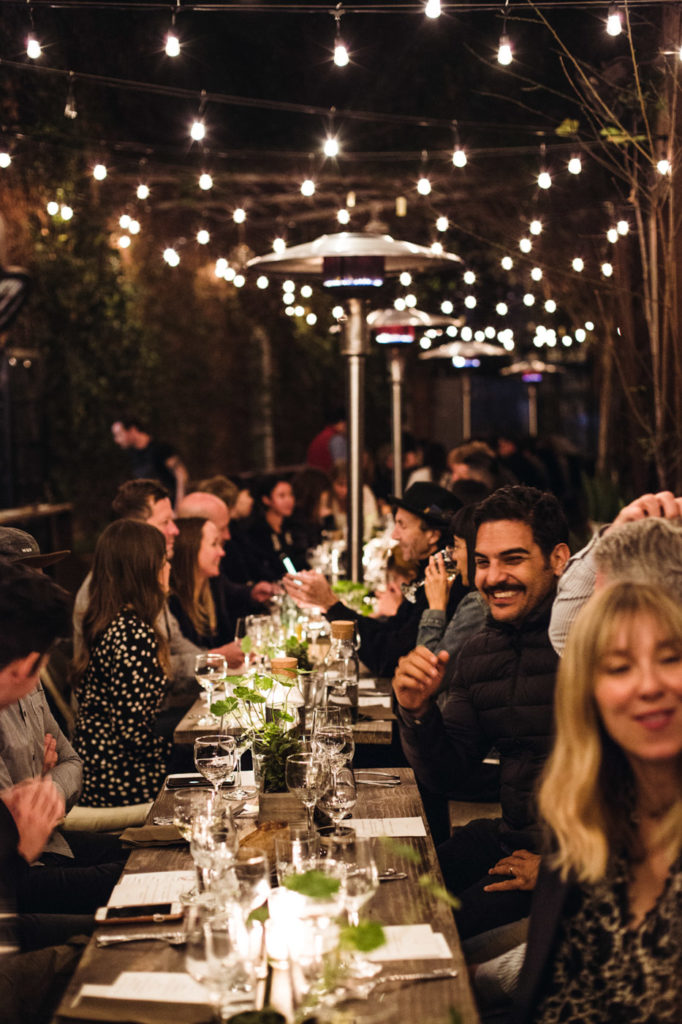
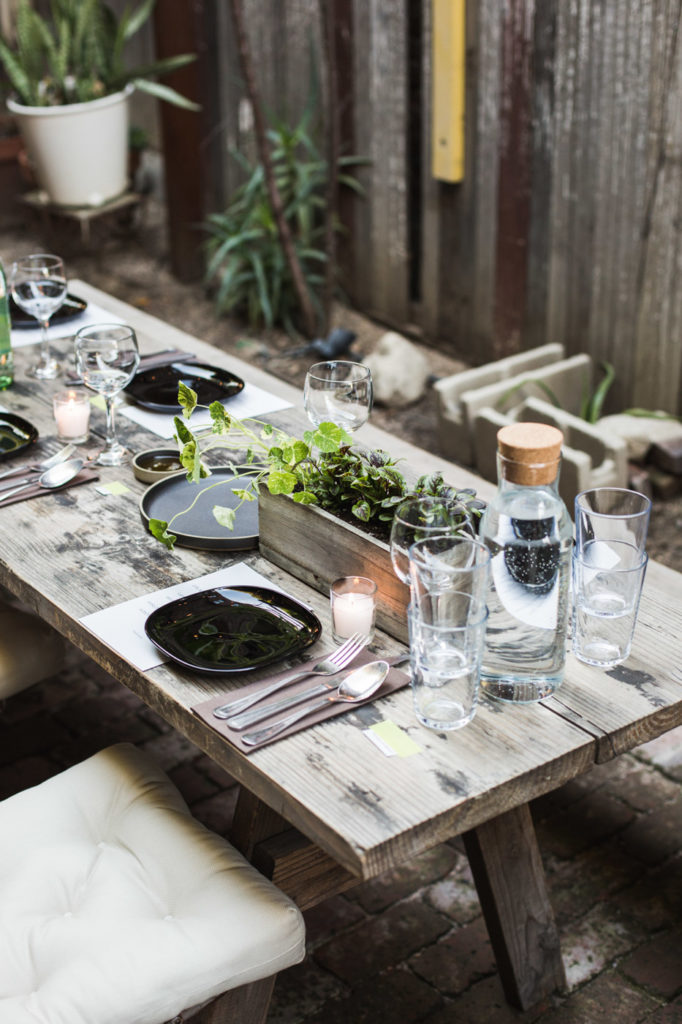
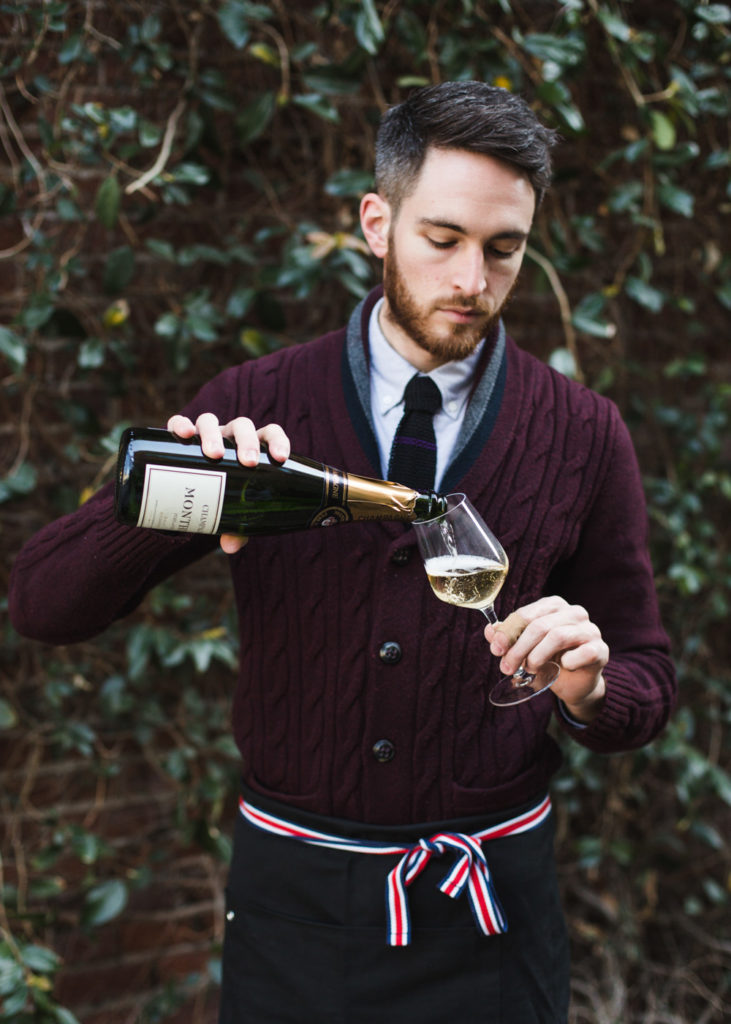

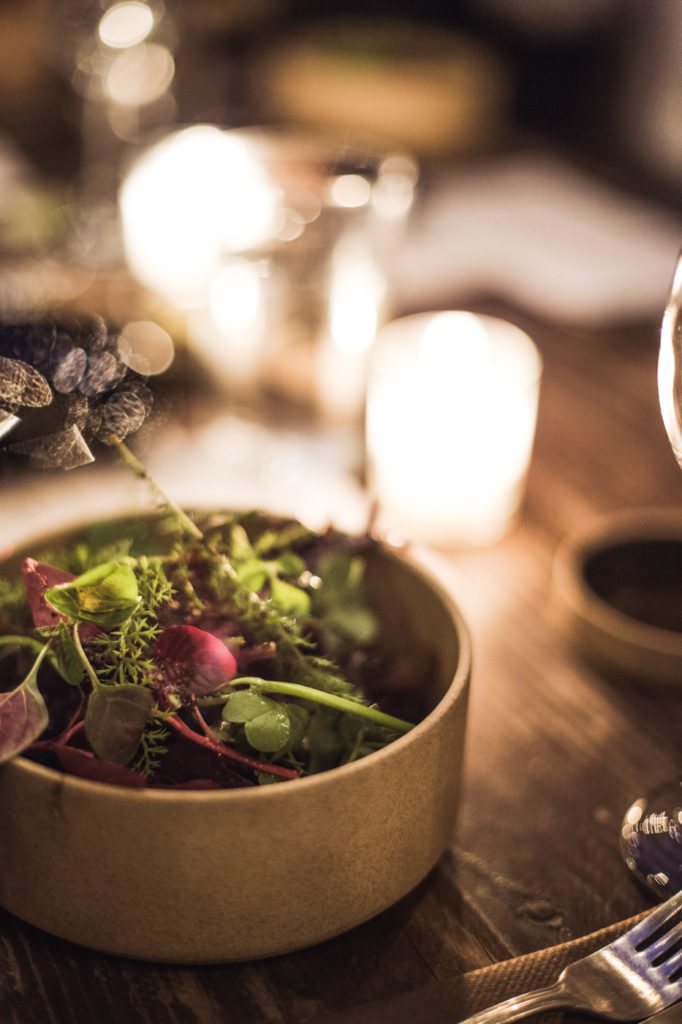
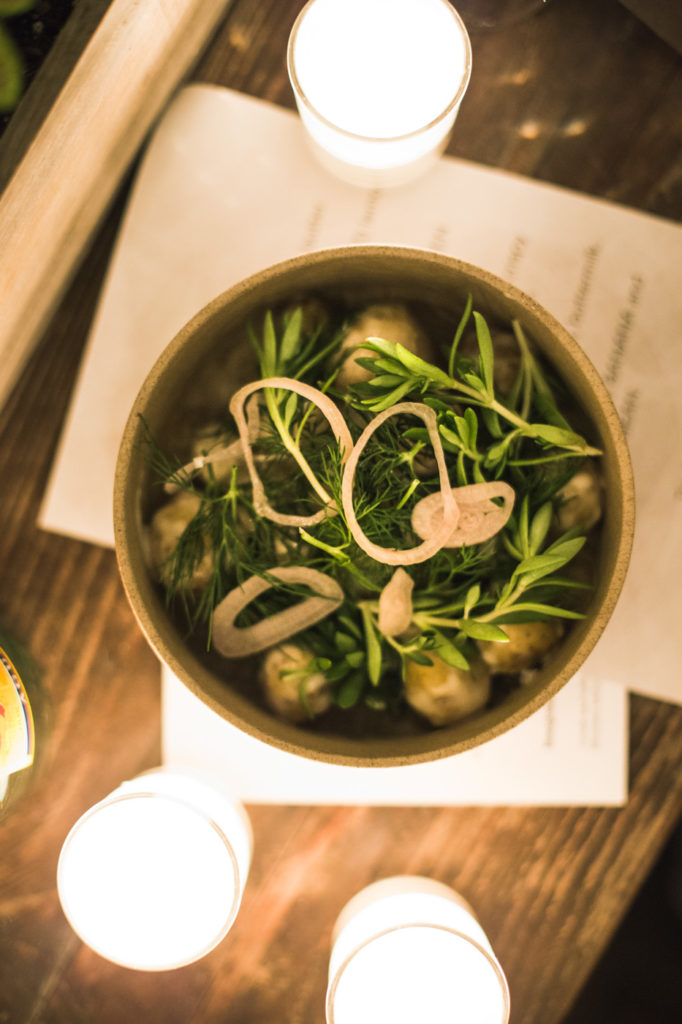
——
“The most fruitful thing to come out of the first dinner is all the guests learned about Akasa and what Triniti is capable of, as well,” Wynn says back at Triniti, a few weeks after the March dinner. “Aaron, from Girl & Dug, reached out and asked to sit and have a meeting just the week after [the dinner], and he asked how much produce Akasa uses in a given week. He said his wife and him were so inspired, they want to donate all their extra produce so Akasa can use [it] for their classes.”
In addition to bringing awareness to partnerships to Akasa and Triniti, the dinner also helped raise money for Akasa. “Just bringing together very entrepreneurial, culinary-minded people to hear what Akasa is doing, what we’re doing resulted in more people wanting to get involved,” Wynn adds.
“Because Joe and David understand our philosophy and our mission and also see how the two organizations can complement one another, there are a lot of ideas floating around right now,” Parsons concludes. Regardless of what comes next, one thing is certain, L.A. has proven rich soil in which to plant seeds for a healthier community.
——
Correction: May 16, 2018 — An earlier version of this story referenced Lettuce Grow installing their towers for Akasa when in fact Akasa purchased and installed the towers themselves.





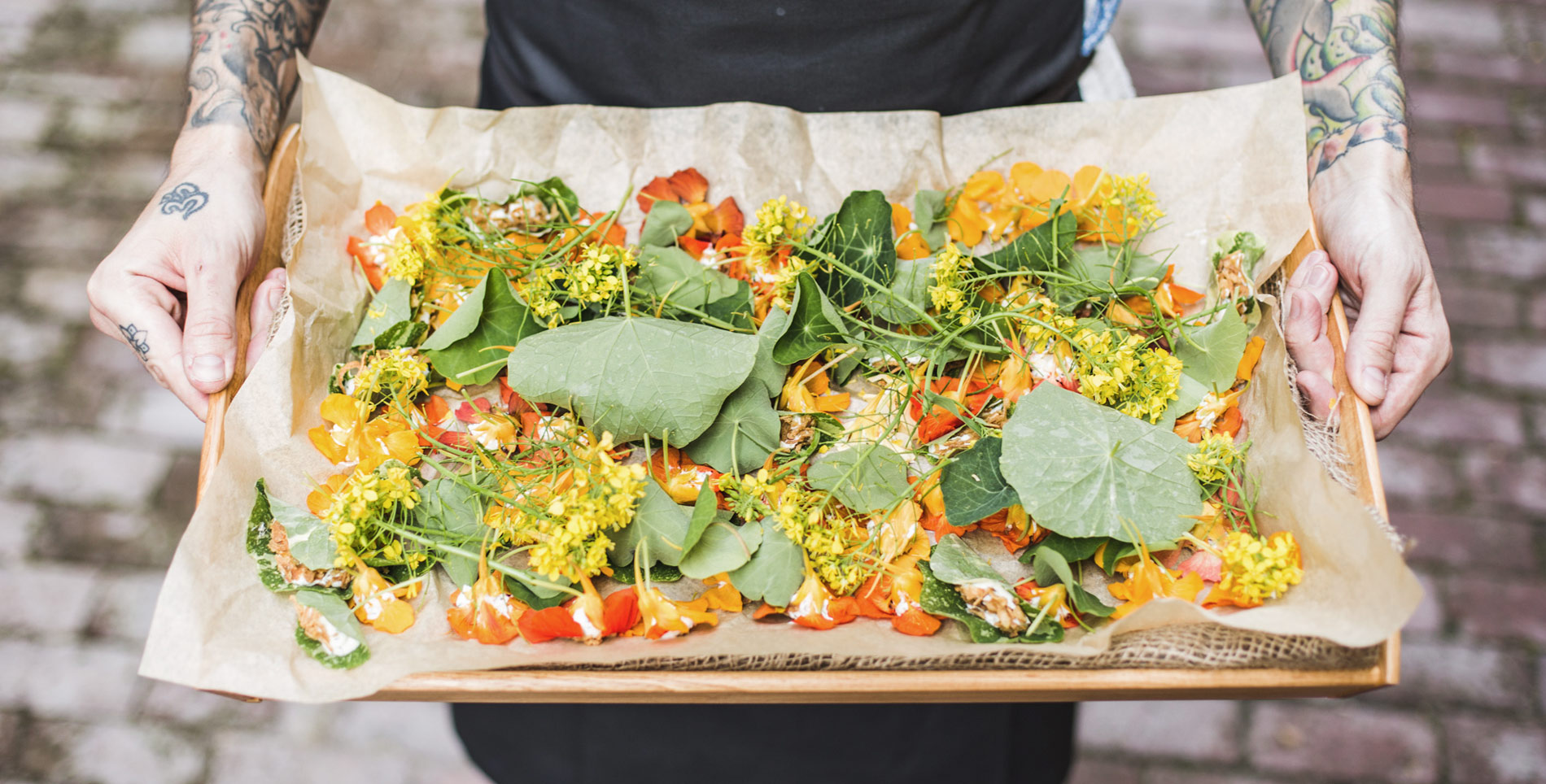

Our comments section is for members only.
Join today to gain exclusive access.